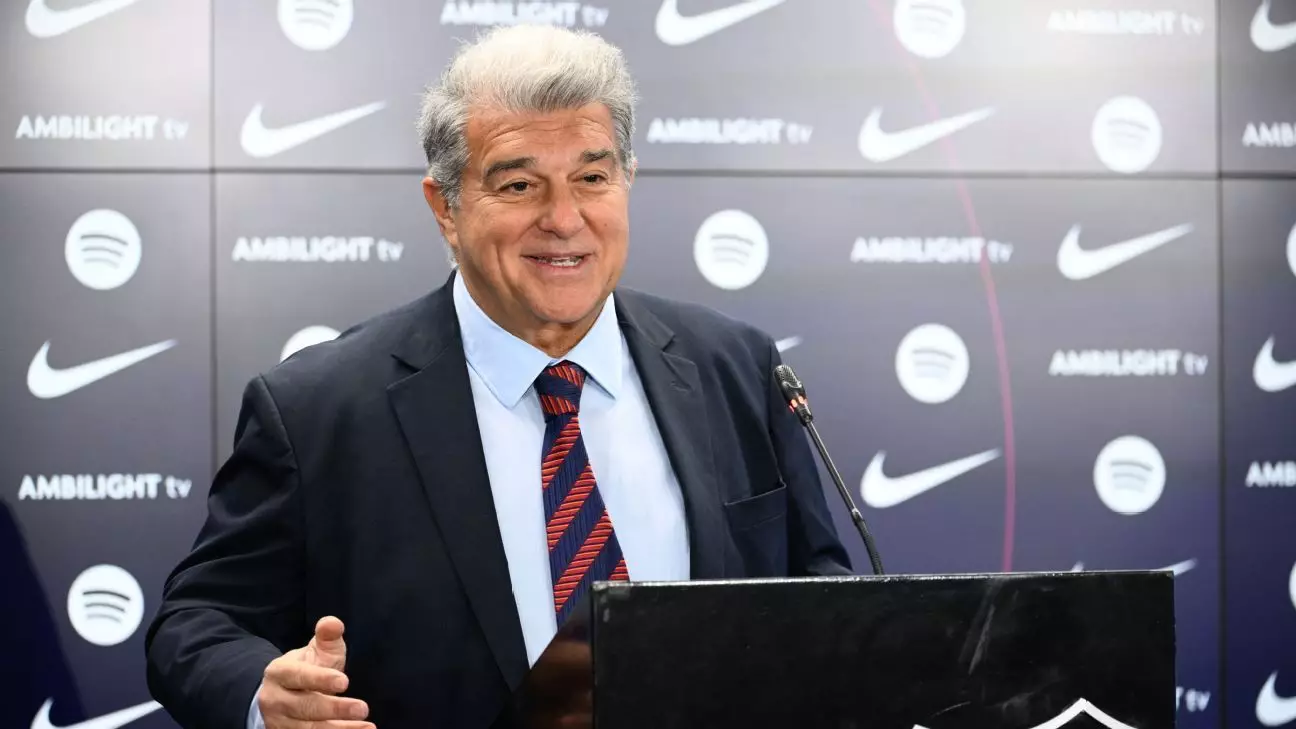FC Barcelona, a football club steeped in history and ambition, finds itself embroiled in a controversy that has sparked conversations both within and outside its walls. At the center of this upheaval are two players, Dani Olmo and Pau Víctor, who were denied their crucial registrations for the second half of the season. The club’s president, Joan Laporta, staunchly defends the club against what he perceives to be a malicious campaign aimed at unsettling this prestigious institution. This article delves into the dynamics of the situation, evaluating the club’s stance and the broader implications encapsulated in Laporta’s statements.
The saga began when LaLiga and the Royal Spanish Football Federation (RFEF) announced that Barcelona had missed a key December 31 deadline pertaining to financial fair play (FFP) regulations needed to finalize Olmo and Víctor’s registrations. This decision has implications not merely for administration but also for team dynamics, as both players contribute to Barcelona’s aspirations. Laporta’s claims that all required documentation was submitted in time highlight a glaring divide between the club’s perspective and the governing bodies’ assessment.
Adding a layer of complexity, Spain’s supreme sports council (CSD) decided to grant temporary registrations for both players, hinting that there might indeed have been merit to Barcelona’s arguments. This turn of events lends credibility to Laporta’s assertions, reinforcing his argument that the club complied with regulations, thereby challenging the narrative propagated by factions outside the club.
In a robust response that lasted nearly two hours, Laporta articulated his disdain for what he termed “a concerted effort to destabilize the club.” His fervent defense reveals more than just a reaction to immediate events; it is also an appeal to the club’s faithful supporters. Laporta’s rhetoric strikes a chord, speaking to the emotional ties of fans who have navigated the club’s periodic struggles. He reassures them that this is not the end, emphasizing Barcelona’s legacy and ability to endure hardships, but the statement’s emotional tenor also uncovers the undercurrents of fear that accompany such controversies.
He boldly contended that these campaigns aimed at undermining Barcelona coincide with a critical juncture in the club’s evolution, where a promising young team is poised to deliver unparalleled joy to its ardent supporters. Through phrases like “they will have to work harder to bury us,” he channels a spirit of resilience, reinforcing the notion that the club will steadfastly rise despite adversity.
The situation is further complicated by dissenting voices from within the club, which Laporta addressed with a pointed critique. He called out specific factions that have challenged his leadership over the handling of the registrations. This internal division echoes broader themes in sports governance, where management often faces scrutiny from various stakeholders.
Moreover, Laporta’s reflection on opposition from rival clubs like Atlético Madrid and Valencia underscores a narrative of isolation, where Barcelona feels besieged not only by external forces but also by critics residing within its own ranks. The footballing landscape is competitive, and Barcelona’s pleas might not be enough to quell the swelling tide of dissatisfaction from rivals eager to capitalize on the club’s woes.
To further bolster his defense, Laporta elaborated on the financial maneuvers Barcelona has undertaken to align with FFP norms. He highlighted a lucrative partnership with Nike, set to double previous earnings, and the sale of VIP seats as significant steps towards restoring financial equilibrium. The assertion that all relevant paperwork was presented punctually adds credibility to Barcelona’s claim of compliance with LaLiga’s stipulations.
Laporta’s financial narrative could have far-reaching implications; if successful, these moves could not only stabilize the club but also enhance its financial standing. The intertwining of sports performance and fiscal health is a salient theme in contemporary football discussions.
As FC Barcelona navigates these turbulent waters, the ongoing saga of player registrations reveals the intricate balance between sports governance, internal politics, and external pressures. Joan Laporta’s defensive stance embodies a larger narrative about resilience in the face of adversity, one that resonates with fans and articulates a vision for the future. Despite the surrounding noise, the club’s commitment to overcoming challenges can potentially energize its supporters, positioning FC Barcelona not just as a football club but as an enduring symbol of loyalty and fortitude. The road ahead will undoubtedly be rocky, but as Laporta emphasizes, the story of Barcelona is far from over.

Leave a Reply